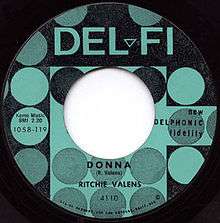Donna (Ritchie Valens song)
| "Donna" | ||||
|---|---|---|---|---|
 | ||||
| Single by Ritchie Valens | ||||
| from the album Ritchie Valens | ||||
| B-side | "La Bamba" | |||
| Released | December 1958 | |||
| Format | 45 record | |||
| Recorded | December 16, 1958 | |||
| Genre | Rock and roll | |||
| Length | 2:20 | |||
| Label | Del-Fi 4110 | |||
| Songwriter(s) | Ritchie Valens | |||
| Ritchie Valens singles chronology | ||||
| ||||
"Donna" is a song sung by Ritchie Valens,[1] featuring the 50s progression.[2] The song was released in 1958 on Del-Fi Records.[3] It reached No. 2 on the Billboard Hot 100 chart the following year, becoming Valens' highest-charting single. It was written as a tribute to his high school sweetheart Donna Ludwig.
Valens' version
The song was recorded on December 16, 1958, at the Gold Star Studios in Los Angeles. Bob Keene is listed as having been the leader of the session, which included Earl Palmer on drums; Buddy Clark on bass; and Valens, Rene Hall, Irving Ashby, and Carole Kaye on guitars.
"Donna", the second Ritchie Valens single released, was the A side of the influential and more famous song "La Bamba". This single was only one of three, along with the previous single ("Come On, Let's Go"/"Framed" – Del-Fi 4106) and the follow-up ("Fast Freight"/"Big Baby Blues" – Del-Fi 4111) ever released in Valens' lifetime. Original Del-Fi pressings of "Donna"/"La Bamba" include black and sea green labels with circles, later replaced with solid sea green or solid dark green labels. Early 1960s pressings have black labels with sea green "sawtooth" outer edge.
Valens' version was positioned at No. 3 on the Billboard Hot 100 pop singles chart when Valens died. Three weeks after Valens' death, the song peaked at No. 2.
Other versions
- The song was notably covered by Los Lobos for the soundtrack to the 1987 film La Bamba which portrayed the life story of Ritchie Valens. In one scene, Valens is shown singing it to his girlfriend Donna Ludwig on the telephone and in another scene Valens is shown recording the song in the recording studio, and in a third scene he is shown performing the song on American Bandstand.
- It was a #3 UK hit in May 1959 for Marty Wilde.
- The song was covered by another Del-Fi artist and western actor, Johnny Crawford, in 1962.
- Bobby Fuller recorded a cover of the song, but it went unreleased until it was put on Shakedown! The Texas Tapes Revisited in 1996.
- Clem Snide covered the song on their 2000 album, Your Favorite Music.
- Cliff Richard covered it twice, first in 1958 on his debut album Cliff and in 1983 on Give a Little Bit More in the US, as well as in Rock 'n' Roll Silver in the UK. The later version was released as a single in the US during 1984 and peaked at 17[4] on the Adult Contemporary chart.
- The Fleetwoods
- The Youngbloods released a version of the song on their 1972 album, High on a Ridge Top.[5]
- The Buffoons (NL) recorded it in 1973
- Donny Osmond covered the song in 1972
- Misfits covered the song on their 2003 release, Project 1950.
- MxPx covered the song on their 1998 album Let it Happen.
- Reel Big Fish reworked the song as "Oh Rudy" on the end of their song "Don't Stop Skankin'" off their album Candy Coated Fury
- The Swedish group Hep Stars make a cover of "Donna" in 1965
- Bobby Vee covered the song in 1961
Answer song
Within days of the death of Valens, in February 1959 Brooklyn songwriters and record producers Bob Feldman and Jerry Goldstein recorded and released (as The Kittens[6]) "A Letter to Donna" (Unart UR2010),[7] that used Valens' tune but with new lyrics they wrote themselves with "John Ottowa" (a pseudonym of Jack Lewis[8]), that sent a message to Valens' girlfriend, Donna Ludwig.[9]
Samples and other uses
New York rapper and Wu-Tang affiliate Cappadonna sampled the refrain in the song "Oh-Donna" off his debut album The Pillage.
The song was used in a television commercial for Visa. In the commercial, a man is getting his arm tattooed with his girlfriend's name on it. He asks midway through the procedure how much it will cost, and discovers that he does not have enough money to cover the cost. He leaves with the tattoo unfinished, and Donna runs away upset. The tattoo says "Don", and the song changes to "Oh Don", to which the man remarks sarcastically, "Very funny".
The song was featured on the soundtrack for the Mafia II video game. It was played repeatedly in an episode of That '70s Show after Eric and Donna break up.
The song is covered in a political advertisement run on television in Hawaii in July 2014 by the campaign of Donna Mercado Kim.[10]
References
- ↑ Rockin' Country Style Archived March 12, 2010, at the Wayback Machine.
- ↑ Hirsh, Marc (December 31, 2008). "Here's an easy way to see if a song uses the Sensitive Female Chord Progression - The Boston Globe". The Boston Globe. Retrieved December 21, 2016.
- ↑ Neely, T: "Goldmine Price Guide To 45RPM Records"
- ↑ "Cliff Richard's US chart positions". Allmusic. Retrieved 2013-04-21.
- ↑ The Youngbloods, High on a Ridge Top Retrieved June 12, 2015
- ↑ "THE KITTENS / EZRA & THE IVIES / BOBBIE & THE BEAUS" (March 10, 2013).
- ↑ "45 Discography for Unart Records". globaldogproductions.info. Retrieved December 21, 2016.
- ↑ Library of Congress. Copyright Office, Catalog of Copyright Entries (U.S. Government Printing Office, 1960):291.
- ↑ Beverly Mendheim, Ritchie Valens: The First Latino Rocker (Bilingual Press/Editorial Bilingüe, 1987):115, 153.
- ↑ "Non-Existent Domain". donnamercadokim.com. Retrieved December 21, 2016.